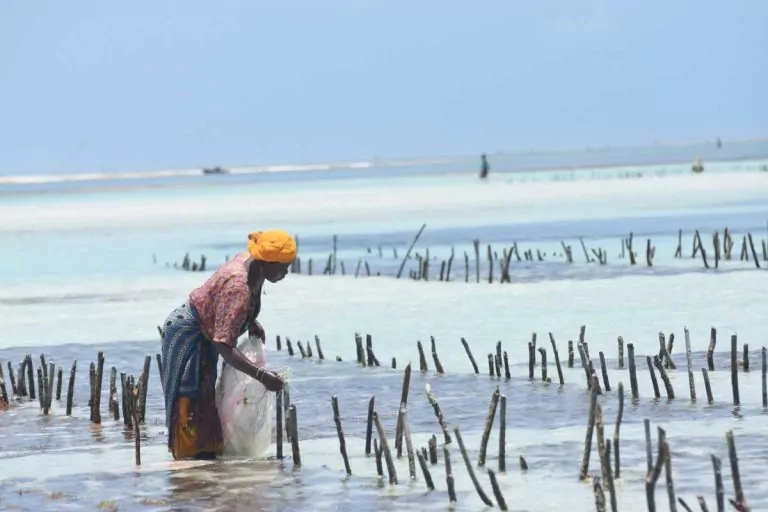Impact Story
Data linking people
NeDiT - New Digital Technologies for Marine Biodiversity Data Handling in East Africa
Coastal East Africa, like any other tropical coastal region in the world, are facing social and environmental changes that can threaten biodiversity, ecosystem functions and services. Coastal resources are intensively used and provide livelihoods for millions of people. Despite various efforts and some successes in marine resource management over the last two decades, the status of biological resources and the rate of ecosystem change, often remain unclear, due to limited reliable information.
NeDiT aims to support the use of new digital technologies to improve biodiversity data management in East Africa, including data provision, assessment, communication and dissemination. The focus of the project is on raising awareness and capacity for the pressing issue of data sharing – building on existing experiences and exploring new opportunities, e.g. from data handling applications or virtual reality for awareness raising.
What unique issue is NeDiT addressing?
Access to up-to-date, reliable, comprehensive, and processed data on marine biodiversity and ecosystems is essential for informed decision-making on sustainable use and conservation of natural resources – not only to identify threats to biodiversity, but also to set conservation priorities and address increasing conflicts over the use of space in coastal environments. Government- and donor-funded conservation and fisheries management projects over the past decade have produced a substantial amount of data, but the information is not routinely archived in a way that makes it easily retrievable, and there is often a lack of user-friendly ways to synthesise information and clear rules of authority and responsibility.
What other unique issue is NeDiT addressing?
Through workshops, conference papers and publications, NeDiT facilitated knowledge transfer among stakeholders involved in marine biodiversity data management, compiled the most relevant databases and assessed experiences in sustainable data management and sharing. The project also assessed how new and innovative digital technologies are contributing to the advanced integration of data from different sources and their overarching analysis.
NeDiT has strong partnerships with:
What has been achieved so far?
NeDiT has been able to
- set up a knowledge base on marine biodiversity data handling in the region and develop a deeper understanding of the information needs of the diverse stakeholders.
- create a network for the exchange of experiences and new ideas in marine biodiversity data handling, facilitating regional exchange of information, data handling experiences and the development of ideas for using new digital technologies.
- evaluate new digital tools for their potential application in coastal and marine biodiversity management in East Africa.
- raise awareness among institutions handling marine biodiversity data of the need for collaboration and the importance of sharing marine biodiversity data.
What else has NeDiT achieved?
NeDiT has furthermore
- built capacity in handling marine biodiversity data among relevant institutions in East Africa.
- developed specific policy advice on marine biodiversity data handling for policymakers in Kenya and Tanzania and submitted jointly developed policy recommendations to the Nairobi Convention Science Policy Platform.
- produced an independent policy brief on data sharing and contributed to IOC-UNESCO activities on the UN Decade of Ocean Science for Sustainable Development.
- reached 100-150 policymakers through the IOC-UNESCO UN Ocean Decade Regional Workshop, WIOMSA Symposium, Nairobi Convention CoP meetings and Science Policy Paper Series as well as 80-120 scientists and 40-60 data handling institutions through training and awareness campaigns.
In what way has NeDiT's co-design approach contributed to positive results within the region?
A co-design workshop held before the start of the project initiated a network of project-related experts and allowed NeDiT to focus on pressing issues. Throughout the project, regional stakeholders showed great interest in the project results. In addition, regional institutions such as Nairobi Convention Secretariat and WIOMSA welcomed the reports and recommendations of the NeDiT project as they aligned with their own efforts, leading to the establishment of a larger joint network and further collaborative projects. Capacities for data handling were strengthened and proposals were made for initiatives to implement new data technologies. NeDiT also developed data collection protocols based on international scientific standards that will be anchored at IMS and other institutions in the region. Close collaboration with regional partners with the necessary political clout, experience and standing in the marine science sector was essential to the success of this project. The partner institutions were able to benefit from the opportunity to apply their research to a situation where the new and innovative technologies could provide significant advances in the handling of environmental data.
NeDiT has published policy briefs and scientific papers on biodiversity data sharing in the WIO region.
NeDiT has convened stakeholders from a range of target groups in East Africa, including scientists, policymakers and public officials.
How does NeDiT support policymakers in East Africa?
NeDiT was designed to develop a long-term strategy for marine biodiversity data handling in East Africa and to provide an exemplary action plan for further sectors and regional up-scaling. To ensure strong political buy-in, NeDiT has consulted a wide range of stakeholders, for example in preparing submissions to the Nairobi Convention Science-Policy Dialogue and the Conference of the Parties. The project also made a significant contribution to the Tanzania Marine Species Database, which is now used by various institutes and government organisations. NeDiT’s reports and recommendations have also led to involvement in the development of a region-wide information management strategy as part of the Western Indian Ocean Governance Initiative (WIOGI). This leads to overall improved information management and uptake in decision-making processes. Activities within the NeDiT project directly fed into regional consultation activities of the UN Ocean Decade of Ocean Science for Sustainable Development, raising awareness of the issue of FAIR data sharing among institutions. The shared use of valid data will enable informed and long-term management decisions at different levels of governance, from local protected areas to regional marine spatial planning, thus contributing to the sustainable management of coastal biodiversity and resources in East Africa.

